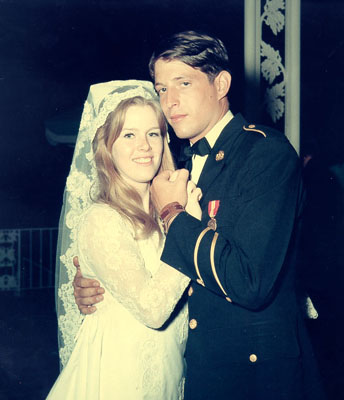
Photo by nara.gov of the Gores, May 19th, 1970
In light of the shocking news of Al and Tipper Gore’s divorce, I was thinking, “how can a couple get a divorce after 40 years of marriage?!” In all news accounts and some personal testimonies from people who know the Gores well, they have mentioned that the Gores just “grew apart over the years.”
No couple enters into a marriage thinking, “We are going to get a divorce sometime in the future.” Every couple wants their marriage to succeed. As Christina and I have done many pre-marital counseling sessions with excited engaged couples, one of the things that we address is the issue of myths and expectations. It is surprising to see that many engaged couples hold on to various myths that can signal trouble once they get married.
Tony Welty wrote an article describing some of the most common myths that couples have about marriage. Welty numerates them for us by writing,
2) Marriage is mainly about personal happiness. As the logic goes, “The goal of my marriage is to be happy. If I’m happy, my marriage will be happy and good.” Not necessarily true. God’s design for marriage certainly envisions happiness; it’s just not the sort of happiness we’re accustomed to experiencing as self-determining individuals. Good and healthy marital relationships are profoundly other-centered. In addressing this false belief with couples, I use several different communication inventories, which require each individual to begin thinking in terms of “us” rather than “me and you.” The ultimate goal here is to train the couple to think of one another empathically.
3) “Our love is so strong we don’t need to work at our relationship. I mean, we never even fight or argue.” This logic suggests that true and pure love can be recognized by the absence of any tensions, constraints, or extra efforts. However, any couple who has been in a covenanted relationship for more than about 10 minutes knows the fallacy behind this belief. The underlying problem here is an over-dependency on the current strength of feelings. The cure is to again train the couple to think about their relationship in a different way. To do this, I will often share personal stories of how God, by taking my wife and me through tumultuous times, transformed some aspect of our marriage. When faced as a “cord of three strands” (the Lord, my wife, and me), marital trials and difficulties purify and strengthen our relationship by forcing us to depend on his faithfulness, rather than our own strength of will. The movement is away from an over-dependence on personal feelings to a settled reliance on covenant faithfulness.
These are just three of the many myths that people have about marriage. With the wedding season under full swing, it will be good to reminds ourselves that marriage is not about making us happy (even though there is a lot of joy), but more about making us holy and more like Christ.



